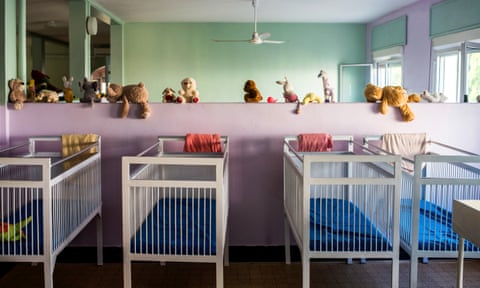Mbeubeuss is one of the biggest rubbish tips in Africa and Senegal’s largest open cemetery for murdered children. In the past three years, the bodies of 32 infants have been recovered from the site by the waste-pickers who work there.
Looking at the high rate of infanticide in Senegal, it seems the main reasons for it are shame about pregnancy outside marriage and a loss of traditional support for young women.
Religious conservatism, economic hardship and a lack of access to contraception and sex education in Senegal are leaving many women I talk to feeling isolated.
In the past, girls could turn to la Badiane – their eldest aunt – who would teach them about sex and contraception as they approached puberty, even taking them to initiation retreats for months at a time.

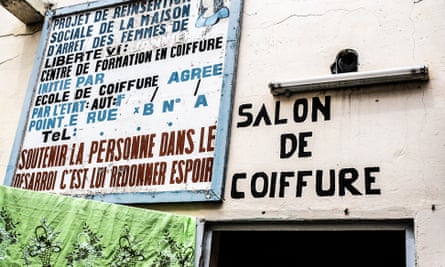

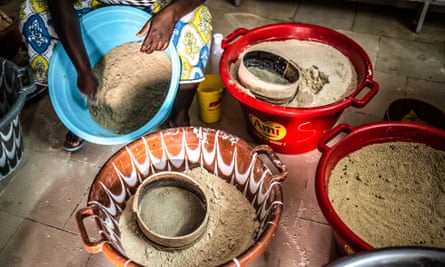
Women prisoners take part in workshops run by Tostan, an NGO that trains the inmates for life after release
Speaking with some of the women who have been jailed for infanticide and photographing the work being done in prisons by the NGO Tostan, which aims to train as many women as possible through workshops so inmates can earn an income after their release, it seems clear the loss of that tradition is keenly felt. Just as the family support has ebbed away, neither is there psychological support available for these women, or anywhere for them to discuss and share their experiences.
“Here, to have a child outside wedlock is something serious and very poorly viewed by society. Women who find themselves in this situation prefer to choke the baby than to suffer the pressure from society,” says Imam Mbaye Niang, a deputy in Senegal’s national assembly.
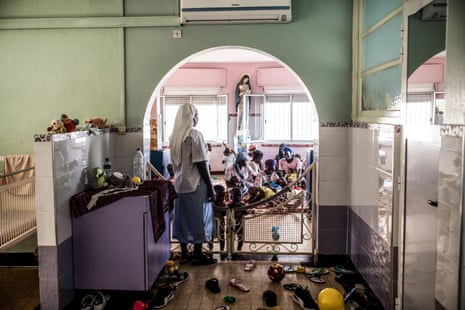
The Pouponnière in Dakar is run by nuns and takes in orphaned or abandoned children
Dakar’s Pouponnière was founded in 1955 to help overwhelmed hospitals, and it provides care for abandoned or orphaned babies. Run by Roman Catholic nuns, it has cared for 4,150 infants; 3,496 of whom were orphans, 550 were adopted or in the process of being adopted and 104 have died. Today, the Pouponnière – one of only a handful of orphanages in the country – cares for about 86 children a year, although few rural Senegalese women know that such a place exists.
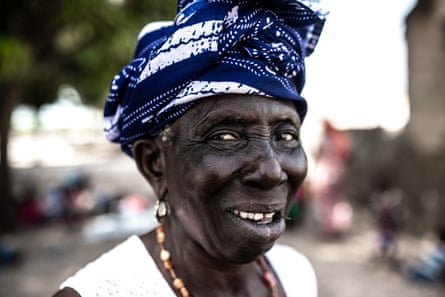
In Senegalese families la Badiane passes on traditional knowledge to girls reaching puberty
It’s traditional in Senegal for every family to have la Badiane – the eldest aunt – provide sex education to young girls. She is also the only person permitted to attend the girl’s initiation in the “sacred wood”. But the tradition has faded, diminishing the women’s role and place in society, with drastic consequences for girls and their sexual choices. The older generation knows about traditional methods of contraception and abortion, and many women interviewed said they felt abandoned by their elders because their mothers and grandmothers had stopped passing on this information. In Senegal, abortion is only available if a woman’s life is deemed at risk, and contraception is expensive.

The ‘sacred wood’, where initiation rituals for young women are traditionally performed
Le Bois Sacré, or sacred wood, was at the centre of the rituals for boys and girls reaching puberty. Amid rapid modernisation and urbanisation, this tradition has virtually disappeared, with the last mass ceremonies taking place in 1968. Girls, under the guidance of la Badiane, would go into the sacred woods for up to three months where they would take part in ceremonies and learn about menstruation and sexuality, and find out about alternative methods of contraception. The loss of such an important rite of passage is often cited as a reason women have less control of their fertility.

In traditional Senegalese households, which are often polygamous, the women and girls do the chores and cooking. In the poorest homes they also often work outside the home selling anything from vegetables to bracelets in local markets
Fatima* is 40 years old. She served five years in prison for killing her newborn daughter and her story is a familiar one. In her small, religious community on an island in the south of Senegal, she fell in love and at 18 was pregnant and unmarried. Despite outside pressure and the stigma, she decided to keep the child. The father of her son, a sailor, was never seen again. She says she and her son endured daily abuse in their community.

Fatima, 40, served five years in jail for killing her baby daughter
After being pushed into a marriage with a much older man, Fatima had four more children. But then she demanded a divorce, a taboo in her family. She was banished from her home and her children were taken from her. She headed for the capital, Dakar, and found work as a housemaid. During this time she sought the help of a Marabout (local religious leader) to try to gain her family’s forgiveness, but he raped her and she became pregnant. Not wanting her child to suffer life as an outcast, she looked in vain for an alternative. Abortion was not an option as she lacked the means and the connections. She gave birth in a rubbish-strewn backstreet. For three days she hid the baby girl from her employers before finally suffocating her.
In Dakar she met a man and became pregnant again. She cannot read or write and is paid less than £1 a day selling whatever she can get her hands on. Fearing for her life and the life of her child, she hid her pregnancy and when the baby was stillborn, disposed of the body. Today she lives hidden away from society in the forest and, with the help of Tostan, makes fruit juice and breeds chickens.
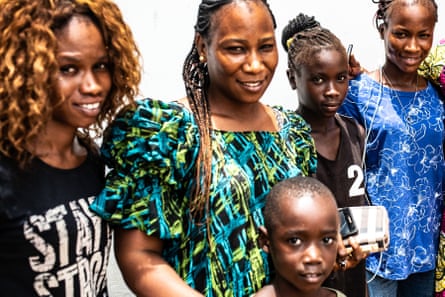
Mariama is a mother of seven who was released a year ago after serving five years for killing her newborn daughter
Mariama* is 42, and mother to seven children. She was released a year ago after serving five years for killing her daughter. At the time she was a widowed, middle-class working woman seeing someone she was not married to. She hid her pregnancy from her family, friends and colleagues. She claims her child was stillborn but admits to breastfeeding her an hour after giving birth. Autopsy reports revealed she had strangled the child before burying her in her garden with the help of her partner. Neighbours called the police and she was arrested the next day. Now remarried, she regrets her actions and warns her daughters of men and their “misguided intentions”.
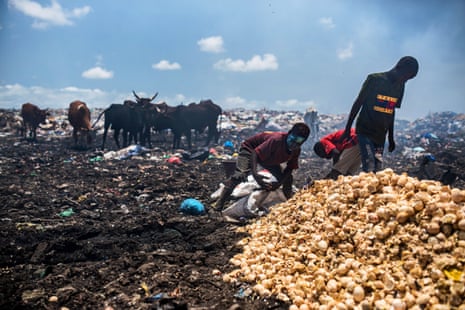
Children, one of whom has painted his face with blue glitter he found at the tip, sort through rubbish at the Mbeubeuss dump. They are often first to discover the corpses of infants
* Names have been changed
